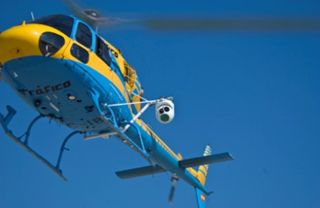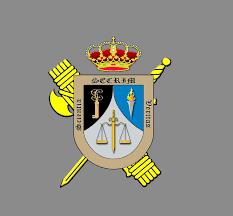

Spanish National News
PEGASUS TAKES TO THE AIR
A mythical creature ridden to defeat a monster, the role of Pegasus is well known through history, but this weekend, a brand new chapter in the history of both the word and the world opened, as Pegasus took to the sky to defeat the beast that is speedi…

A mythical creature ridden to defeat a monster, the role of Pegasus is well known through history, but this weekend, a brand new chapter in the history of both the word and the world opened, as Pegasus took to the sky to defeat the beast that is speeding motorists.
The world´s first airborne radar speed detector is now high in the sky over Spain, nicknamed with the codeword “Pegasus”. The Dirección General de Tráfico, the DGT, has equipped one of their 19 helicopters with the state of the art equipment that is capable of catching speeding motorists who may well be oblivious to the very presence of the spy in the sky.
The DGT has been testing the equipment for the past six years, in conjunction with the company Wescam, who developed the technology, and now have the official legal seal of approval to police the roads from the air.
The distinctive yellow and blue helicopters of the DGT are not new in themselves, but the addition of a camera equipped arm is new, where two high quality recording devices are installed, with a super powerful zoom, that can target and photograph, from a distance of between 300 meters and a kilometre away, with pinpoint accuracy, vehicles travelling at any speed up to 360 kilometres per hour, about the speed of a Formula 1 car. However, it´s not just speed that Pegasus will be on the lookout for, lane infractions, wrong-way driving, mobile phone use and just about any other traffic violation can all be picked up on their super cameras.
The launch of Pegasus coincides with that of the special operation for the busiest time of year for Spanish roads, the Easter holiday period. Running from 15:00 on 22nd or March, until midnight on the 1st of April, the DGT anticipate a total of 13 million traffic movements. In the period up to Wednesday of this week, there is an anticipated 7.5 million trips to be made.
To ensure the smooth and safe flow of traffic, there are some 10,000 Guardia Civil traffic cops on duty for the season, backed up by another 13,000 members of support teams. As well as the marked patrol cars and bikes, the fleet of un-marked camera cars will also be patrolling, with the majority of traffic set to head towards coastal areas at the start of the season, returning back in land at the end.
Although it may be easy to criticise the move as nothing more than a “money making scheme”, the developments in traffic policing are all based on the needs for safer roads. In fact, the primary role of Pegasus will be patrolling secondary roads, rather than motorways, where traditional radar monitors may have difficulties due to the central reservation in many places, but secondary roads are the scene of around 75% of all fatalities.
According to the 2013 World Health Organisation Road Safety Report, Spain has a better record than France, Austria, Australia, Belgium, Canada and the United States in terms of road accident fatalities per 100,000 inhabitants, where it now stands 12th on the global list . It now also forms part of a select group of countries with comprehensive regulations on the five most important risk factors in terms of road accident rates.
Spain is one of the 28 countries with suitable legislation for reducing road accident rates based on the five fundamental risk factors in road accidents: excess speed; driving under the influence of alcohol; not wearing a helmet on motorcycles; seatbelt use; and child safety restraints. These factors have helped lower the number of fatalities and injuries caused by road accidents over the last nine years.
The Global Status Report on Road Safety 2013, drafted by the World Health Organisation, presented recently by the Director-General for Public Health, Social Services and Equality, Mercedes Vinuesa and the Director-General for Traffic, María Seguí, reports that governments are adopting successful measures to reduce road accident mortality rates but that they are still insufficient, as shown by the fact that 1.24 million people are killed in road traffic accidents every year around the world. According to the WHO, this figure means that road traffic accidents will become the fifth-largest cause of death in 2030 if no urgent steps are taken.
Spain has improved since the previous report published by the WHO in 2009, which related to data from 2006. Spain is one of 88 countries around the world that has reduced the number of road accident fatalities – from 4,104 in 2006 to 2,478 in 2010. This trend has also been maintained in subsequent years.
Spain is one of 35 countries that enacted new road safety laws in the period 2006-2010. Observance and compliance with these laws has improved since the previous report with regard to such issues as the use of helmets and safety belts, the use of which has risen by 1 point and scores Spain an 8 from a maximum of 10. The use of child safety restraints continues to increase (up 2 points). Whereas the use of these devices in Spain scored 6 in the first report, the report presented last week now scores Spain a mark of 8.
On the issue of speed and alcohol, Spain continues to score highly in terms of legislation and compliance with the law. Spain is one of the 59 countries that have reduced speed limits in urban centres to 50 km/h or less. The WHO recognises that reducing the maximum speed limit to 30 km/h in areas of considerable pedestrian and cyclist concentration is an effective way to reduce injury rates among road users.
So, whichever way you look at it, safety is the underlying reason for the legislation and control. After all, there is probably no driver on the roads who doesn´t push the boundaries of the law a little, assuming we will never get caught, which is all very well until we do, or, in the worse case, a fatal incident occurs. But keep a sharp eye out, as you drive through Spain, because you may now never know when you might get caught out, unless you drive to the letter of the law, in which case, long may you continue.
Filed under: http://www.theleader.info/article/38309/
Car and Motor Insurance | Spanish Home Insurance | International Money Transfers | Send Money to Spain | Spain Property | Online International Payments | Property in Spain
Costa Blanca Property for Sale | Cabo Roig Property for Sale | International Payments |
-

 Driving in Spain2 weeks ago
Driving in Spain2 weeks agoHow Long Does it take to Receive a Traffic Fine Through the Post?
-

 News2 weeks ago
News2 weeks agoYour Task for This Week is to Seek Out a Monument – The Week Ahead
-

 Health1 week ago
Health1 week agoQuirónsalud Elche and Quirónsalud Gran Alacant strengthen their services with the incorporation of a new team specialised in advanced ophthalmology
-

 Court News2 weeks ago
Court News2 weeks agoMan in court accused of trying to kill ex-partner with an axe
















